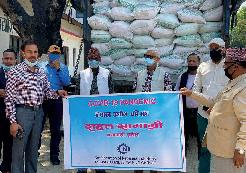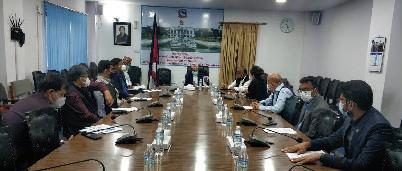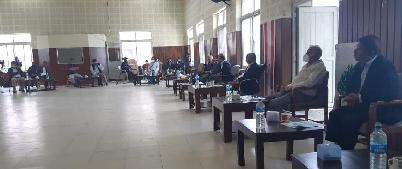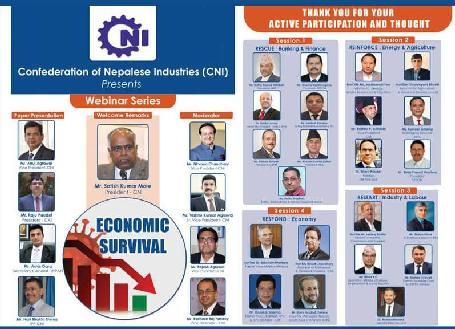
16 minute read
CNI And Covid-19
from CNI Chronicle 2020
by CNI - Nepal
Talking Business, Talking Change
CNI’s Support during COVID-19 Crisis
Advertisement
Confederation of Nepalese Industries (CNI) in collaboration with various levels of Government continuously distributed food items required to cope with the terrible situation caused by the coronavirus. CNI, in coordination with the local bodies, provincial and central government, provided food items to those who are in need of food in all the 7 Provinces of Nepal as well as different places of Kathmandu Valley.
Thousands of packets containing rice, pulses, salt, oil and other essential items have been handed over. CNI handed over different medical supplies including testing kits, PPE and face masks to the government. The total relief packages worth Rs. 83 lakhs have been distributed.
In such a critical situation, we urge CNI members to continue the production of daily essentials and also to keep the supply chain management intact. We also appeal to all concerned to facilitate the movement of workers and employees working in such factories and industries.

www.cnind.org
Discussion on COVID-19 between confederation of nepalese industries and nepal Bankers’ Association
22nd March, 2020

CNI and the Nepal Bankers’ Association (NBA) discussed the possible impact of the Global Pandemic on the industry, business and banking sectors of Nepal.
It was concluded that the business industries and banks run by the private sector are complementary to each other and hence, the private sector and the bank should form a common view on the possible impact of COVID-19 in the coming days. Direct impact on the tourism and aviation sectors has been observed at present, but it will have an impact on the overall sector in the upcoming days. So, the government needs to draw attention towards making necessary arrangements for the smooth operation of business producing and distributing essential commodities.
The government is also expected to assist with the wages of workers in case of closure of industries and businesses by extending the deadline for advance tax and VAT, restructuring debt, etc. Discussions were also held on the ways to make the services provided by the private sector effective in the event of a lockdown announced by the government. At present, the cooperation between the private sector and banks is of special importance in order to meet the expectations of the private sector from the banking sector through the support of the government.
The discussion was attended by CNI President Satish Kumar More, CNI Senior Vice President Vishnu Kumar Agrawal, Vice President Rajesh Agrawal, Banking Committee’s Coordinator Anal Raj Bhattarai and Bankers Association President Bhuwan Kumar Dahal, VicePresident Anukul Bhatnakar and Advisor Anil Shah.
Talking Business, Talking Change
CNI delegates meet Deputy Prime Minister and Coordinator of Nepal Government High-Level Coordination Committee for COVID-19 Crisis Management Centre to Discuss on COVID-19
Positive Steps are being Taken by the Government and the Central Bank; Believes CNI
23rd March, 2020

A delegation from the Confederation of Nepalese Industries (CNI) has a discussion with Ishwar Pokhrel, Deputy Prime Minister and Coordinator of the Nepal Government High-Level Coordination Committee for COVID-19 Crisis Management Centre on what steps can be taken by the private sector to help the government cope with the spread of the global pandemic. The discussion was focused on the areas where the private sector can help the Government in maintaining regular supply chain, cooperating in procuring essential health items, and assisting in the construction of necessary infrastructure for preventing the pandemic.
Informing about the government’s preparations, Deputy Prime Minister and Coordinator Ishwar Pokhrel clarified that the inevitability of cooperation in the supply of essential health items and to cope with the difficult situation by working closely with the private sector. On these issues, CNI President Satish Kumar More, expressed his commitment to transfer the available assistance to the government as soon as possible through the coordination with the private sector. CNI President Emeritus Binod Chaudhary informed about their state of readiness to provide necessary cooperation and assistance.
CNI Office Bearers and members of the Governing Council were present at the discussion.
30th March, 2020
The Global Pandemic- Corona Virus, is affecting almost every country in the world. Even Nepal is trying to fight the pandemic and to prevent it from spreading. The Government of Nepal is issuing and implementing various directives. The country is in a state of lockdown. Even in such a critical
www.cnind.org
situation, CNI is assisting on its behalf. It is providing health-related relief materials to the government as well as motivating its members to produce and maintain the supply chain of essential items.
Apart from the essentials, other sectors are closed and the impact of the world’s economy is certain to be felt in Nepal as well. CNI has welcomed the recent steps taken by the Nepal Rastra Bank to protect the economy from such a precarious situation. CNI believes that certain changes in monetary policy will help to maintain liquidity in the economy. The Central Bank of Nepal has considered the various issues raised by CNI at different times, which we believe will help in maintaining the morale of the private sector.
Similarly, the Government of Nepal has recently taken some important decisions about the financial sector. The relief was announced at a time when the government was highly expected to protect Nepal’s economy. The government has decided to provide relief to poor families and daily wage earners, which is a very positive step taken by the government. The CNI is confident that the government will come up with medium and long-term relief as well with an arrangement of short-term reliefs at present. Such relief arrangements are necessary to revive and rejuvenate the business and social world while protecting the economy. It is everyone’s responsibility to bring the currently closed industries and businesses back to full capacity operation.
In such a situation, we would like to make a heartfelt request to all stakeholders, including the government, not to let the morale of the private sector go down.
CNI & FNCCI Jointly Submitted Suggestion to the Government of Nepal in Regard to the Wage Payment
22nd April, 2020
The entire business sector has come to a halt due to the lockdown imposed by the Government of Nepal across the country to curb the global pandemic of COVID-19. This has created various problems for the industry and business sector. In the current situation, it is very difficult for the industry and business sector to pay more than 50 percent of the wage, so the decisions made by the Government of Nepal regarding the wage payment will create problems in implementation. CNI, FNCCI and other private sector organizations submitted the joint suggestions relating to the payment of wages to the Government of Nepal on 10th Baisakh, 2077. As it is necessary to protect both the industry and the workers, the entire private sector of Nepal heartily requested the Government of Nepal to review the decisions made by the Government regarding the payment of wages with due consideration of the presented suggestions.
Talking Business, Talking Change
Private sector Meets the chief secretary of nepal
23rd April, 2020

CNI, FNCCI & NCC Officials met and drawn the attention of the Chief Secretary regarding the Corona virus pandemic and its aftermath. When the country is in such a precarious situation brought by the Corona Virus and lockdown, the country’s leading private sector organizations have come together and are looking for various ways to save the economy. The attention of the Chief Secretary has been drawn towards the results of the study conducted in collaboration with international organizations. A joint study report has also been handed over to the Chief Secretary.
The private sectors have suggested the government to move forward with two basic things. It has been asked to help the poor, those working in the informal sector and the self-employed through fiscal policy. About 5 percent of Nepal’s Gross Domestic Product (GDP) needs to be transferred directly or indirectly in such sectors. Studies have shown that this can prevent the economy from going into recession while avoiding the decrease in overall demand. Similarly, it has been asked to support Nepal’s industrial and commercial sectors through monetary policy. For this, the government is asked not to allow liquidity shortage by making some changes in the existing monetary policy without direct investment. It is suggested to reduce the interest rate on the loan by 5 percent and maintain the policy for the next three years to prevent the shutting down of industries and business enterprises.
The Chief Secretary was informed about the fact that the employers could not pay the salaries and wages as the transactions are closed during the lockdown. The industrialists shared their views that the industry could pay maximum 50 percent of the wages for the period of lockdown and the remaining 50 percent should be paid by the government through various measures.
The Chief Secretary said that the government is taking a serious consideration at this as it is aware that the private sector contributes 70 percent of Nepal’s economy directly. “The Government of Nepal understands the private sector and is formulating policies accordingly. We will not let industries and businesses to collapse because of the crisis,” he said. He
www.cnind.org
also added that even if Nepal’s economic growth rate could not be maintained as in the past, it would not be allowed to fall below that of other countries either. For this, “The government is willing to work with the private sector.” The government has been positive towards allowing the necessary industries to run. He also informed that a decision on this issue will be taken soon.
The discussion was attended by the CNI President, FNCCI President and NCC President as well as Senior Vice Presidents of all the three organizations and other officials.
Private Sector Meets Former Prime Minister Deuba and Leader of the Opposition Party in the Parliament to Discuss on Resolving the Crisis in Nepal’s Economy caused by COVID-19 Pandemic
6th May, 2020

Private sector interacted with Nepali Congress President and Former Prime Minister Sher Bahadur Deuba regarding the government’s policies, programs and budget for the upcoming fiscal year. Congress President Deuba said that he would create pressure on the government as an opposition party to resolve the economic crisis caused by the pandemic. He also said that the Nepali Congress was positive towards the concept presented by the private sector to solve the problem and ask the government to address it through the budget. On the occasion, Nepali Congress leader and former Finance Minister Gyanendra Bahadur Karki said that the private sector should focus on import substitution to build a self-reliant economy.
During the interaction, CNI President, Satish Kumar More said that it was necessary to bring an economic recovery package to reduce the crisis in the economy due to the Corona Virus pandemic and the lockdown. He also mentioned that joint efforts of the
Talking Business, Talking Change
government, private sector, political parties and other stakeholders are needed to prevent the economic loss and to manage the employment. FNCCI President, Bhavani Rana and NCC President, Rajesh Kaji Shrestha said that they have expected further relief through the monetary measures to be taken by Nepal Rastra Bank. FNCCI Senior Vice-President, Shekhar Golchha said the budget should address measures to reduce the rising cost of investment considering the Corona crisis. HAN President, Srijana Rana said that the current crisis has severely affected the tourism and hospitality sector and hence requested more flexible policy from the government to provide adequate relief in bank loans and labor management.
Giving a presentation on the joint suggestions submitted by the private sectors, CNI Vice President, Anuj Agarwal had requested to bring an economic recovery package. Vice President Agarwal said that measures related to the financial, monetary and industrial sectors have been presented so as not to impose an additional burden on the government while facing the dire economic crisis. He also said that suggestions have been made to move towards expansionary fiscal policy and stimulus package, employment and investment-oriented policies. Keeping these suggestions in mind, Nepali Congress is expected to play an active role in the parliament as main opposition party. CNI Senior Vice President Vishnu Agrawal said that as industry, trade and business may collapse due to prolonged lockdown due to COVID-19. It is necessary to start working on ways to run the economy by relaxing the current lockdown with the necessary precautions. On the occasion, other representatives of private-sector organizations also expressed their views on the impact of the Corona Virus on the economy and industry.
CNI Presents COVID-19 Economic Survival: Webinar Series
18-21 May 2020
The Confederation of Nepalese Industries (CNI), in partnership with Frost & Sullivan, designed a four-part webinar series to discuss the impact caused by COVID-19, as well as strategies to kickstart economic recovery. The themes covered were Rescue: Banking and Finance, Reinforce: Energy and Agriculture, Restart: Industry and Labor, and Respond: Economy. The panelists comprised of industry experts, policy makers, government representatives, and thought leaders.
The first webinar, Rescue: Banking and Finance, hosted discussions about the impact on the financial sector, as well as strategies for survival and recovery. All major sectors that contribute to Nepal’s GDP have been significantly affected. Of those, the tourism and manufacturing industries have been most affected, while the agricultural industry has been least affected. The first step towards economic recovery is to recreate market demand. An effective way to achieve demand is to expand the ICT sector. Additionally, liquidity needs to be injected into the economy to make capital markets accessible to investors.
www.cnind.org
The second webinar, Reinforce: Energy and Agriculture, focused on impacts and recovery plans for the energy and agriculture sectors. For the agriculture sector to yield higher productivity, systematic planning and restructuring of the sector is needed by incorporating climate, soil, and market conditions, as well as by introducing mechanization. The sector should be lucrative enough to attract a portion of migrant returnees. The energy sector should be offered subsidies to help counter-balance the current losses being felt. Long term incentives should be provided to investors of hydropower projects to encourage quality construction, production, and maintenance.
The third webinar, Restart: Industry and Labor, explored opinions regarding the impact of the pandemic and lockdown on industry as well as the resulting unemployment crisis. 60% of all workers in Nepal have lost their jobs due to the pandemic. The government needs to design and distribute a stimulus package, as the largest issue hindering industry is the lack of purchasing power. Additionally, cash relief will be essential for the millions of workers who are displaced. As the labor sector cannot exist without the private sector, plans need to be designed and implemented to reopen the economy gradually sector-by-sector.
The fourth webinar, Respond: Economy, focused on the overall economic impact of the pandemic, as well as strategies to restart the economy and accelerate economic growth. Based on effective stimulus packages of other nations, the government of Nepal should create a stimulus package of about five percent of GDP (~$1.5 billion). Building adequate infrastructure to handle the pandemic, using modern technology to promote e-commerce, and focusing on the survival of MSMEs should be the immediate plans for survival and recovery. The large number of returnee migrants should be mobilized through provision of adequate training and funding to recover GDP contribution lost from remittance. Manpower with quality health and education is the key to Nepal’s economic growth, so longterm investments need to be made in those sectors as well.

Talking Business, Talking Change
Highlights: What Needs to be Done to Improve the situation?

• The government should distribute stimulus package comprising of 5% of GDP among the most affected sectors to reinvigorate the economy
• The nation has to have adequate infrastructure to handle the COVID-19 pandemic
• Industries need financial stimulus; At least NPR 250 Billion will be required.
• We have to look at and find a healthy equilibrium between health of the people and healthy economy.
• Immediate relief: first 3 months; both to firms and households.
• 4.4 million people are working in the Informal sector, we might have to distribute relief to about 2 million people from the informal sector: NPR 6 billion per month needed
• For returning migrants, soft loans for based upon their skills to turn them into employers
o Private sector can be provided with wage subsidies to hire migrant returnees
o Contract farming can be offered to migrant returnees • Secure working capital for the private sector by increasing liquidity
www.cnind.org
:jbzL khL, :jbzL >d . :jbzL pTkfbg, :jbzL kofhg ..




High-quality hardwood oring Made in Nepal. Healthy choice for interior environments. Eco Parquet & Decorator P. Ltd.




Tel : 01-4445589, 9851036513. Showroom : Gairidhara, Kathmandu. Factory : Pithua, Chitwan. E-mail : ecoparquet73@gmail.com Website : ecoparquet.com.np Facebookb : eco parquet & decorators pvt.ltd.
• SMEs are the largest job providers in Nepal. Their total loan is about NPR 384 billion: interest subsidy of 3% will be adequate
• The use of modern digital
technology for researched and documented record of the size of the economy and wealth of the nation
• Nepal must invest in the technical education of the masses, because human capital is the most important capital
• Create a system of social security, so that nobody has to die without food and medicine
• The structure for job creation should be done by banks and financial institutions who have the largest and widespread network in the country
• General relaxation of rules and regulations pertaining to doing business so as to promote it and strengthen the economy
Highlights: What is the Expected long-term Impact and Policy level Measures being Put in Place?
• Recovery: 12 months after that the initial 3 month of immediate relief - conditional grants to entrepreneurs and returning migrants, loan restructuring for the private sector, alternative modes of mobilizing finance, like PPPs, etc.
• Resilience: 24 months - digital platforms, FDIs, etc. • Innovative and efficient land management policies have to be introduced to fully utilize our resources as well as to absorb the massive influx of skilled people who will be returning from foreign destinations
• Restructure our politics and bureaucracy for a more efficient government.
• Need of One Window Policy to attract FDI
• The government should think about how to draw in all the cash that is lying around informally so that the crunch in liquidity can be mitigated








